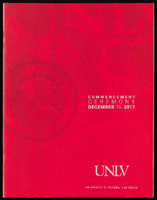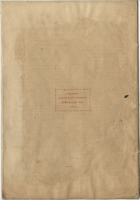Search the Special Collections and Archives Portal
Search Results

University of Nevada, Las Vegas (UNLV) Fall 2017 commencement program
Date
Archival Collection
Description
Commencement program from University of Nevada, Las Vegas Commencement Programs and Graduation Lists (UA-00115).
Text

Angela Castro oral history interview: transcript
Date
Archival Collection
Description
Oral history interview with Angela Castro conducted by Stefani Evans, Cecilia Winchell, Kristel Peralta, Vanessa Concepcion, and Ayrton Yamaguchi on November 05, 2020 for the Reflections: The Las Vegas Asian American and Pacific Islander Oral History Project. Castro begins the interview by talking about her early life, childhood, what Guam was like, and the history of her parents and grandparents. She describes the difference in public and private education in Guam and compares it to the United States. She explains the reason why she moved to Las Vegas, Nevada in 1998 and attended the University of Nevada, Las Vegas for public relations. Castro then talks about the differences between older and newer generations, the political atmosphere in Guam, and the differences between the United States and Guam in politics. She also talks about the discrimination she has experienced throughout her life and diversity in the workplace. Lastly, she describes her culture and traditions during holidays, the struggles with an absence of culture within her family, and her personal religious beliefs.
Text
Nellis Air Force Base Photograph Collection
Identifier
Abstract
The Nellis Air Force Base Photograph Collection contains photographs of Nellis Air Force Base and its predecessor, the Las Vegas Army Airfield, as well as photographs of Rockwell Field and McCarran Airport in Las Vegas, Nevada from 1926 to 1980. The materials contain photographs of military aircraft, hangars, buildings on the base, and aerial photographs of Las Vegas and the surrounding area. The materials also include photographs of the entrance of McCarran Airport, U.S. Senator Pat McCarran, and a mail plane arriving at Rockwell Fields in 1926.
Archival Collection
Rita Deanin Abbey Exhibition Catalogs
Identifier
Abstract
The Rita Deanin Abbey Exhibition Catalogs (1975-1991) are comprised primarily of exhibition catalogs featuring Abbey's art at various museums and international exhibitions including the Palm Springs Desert Museum, the University of New Mexico Art Museum, Biennale Internationale d’Email Laval, and the International Exhibition of Enamelling Art in Japan. The collection also contains invitations to Abbey's art shows at the University of Nevada, Las Vegas as well as a copy of Abbey's curriculum vitae. Also included are select issues of
Archival Collection
Urban Chamber of Commerce of Las Vegas, Nevada Records
Identifier
Abstract
The Urban Chamber of Commerce of Las Vegas, Nevada Records date from approximately 1980 to 2009 and contains the organizational records of the Urban Chamber of Commerce of Las Vegas, Nevada (UCC), one of the many chambers of commerce in the Las Vegas, Nevada area. The mission of the Urban Chamber of Commerce is to create and foster an environment that promotes development of members and Black-owned businesses. The collection is comprised of publications, financial and administrative records, various event information, and photographs of events and membership.
Archival Collection
Equal Rights Nevada Collection
Identifier
Abstract
The Equal Rights Nevada (2000-2002) collection is comprised of organizational records documenting the group’s unsuccessful fight against Question 2, a referendum voted upon in 2000 and 2002 to amend Nevada’s state constitution to forbid same-sex marriage. It includes campaign files, financial records, publicity, correspondence, ephemera, and other supporting documentation from national and regional marriage equality organizations.
Archival Collection
Greenpeace Pacific Southwest Records
Identifier
Abstract
The Greenpeace Pacific Southwest Records are comprised of files and documents pertaining to environmental activism in Southern Nevada from 1962 to 1994, primarily addressing the organization of protests at the Nevada Test Site. The collection contains newspaper articles, newsletters, publications, financial records, protest information, correspondence, meeting minutes, articles of incorporation, Freedom of Information Act requests, and Nevada Test Site information. Also contained in the collection are maps and documents related to various environmental issues such as nuclear waste, land use, wildlife protection, and international environmental activism.
Archival Collection

Diane Meireis oral history interview: transcript
Date
Archival Collection
Description
Oral history interview with Diane Meireis conducted by Claytee D. White on November 06, 2017 for the Remembering 1 October Oral History Project. In this interview, Meireis discusses her experience at the 1 October shooting. She remembers hearing gunfire, the confusion in the crowd, and finding a safe place to hide. Meireis describes the collaboration of strangers, and feeling guilt for not being able to help others as she escaped the venue. Lastly, Meireis discusses her opinions of firearms.
Text

